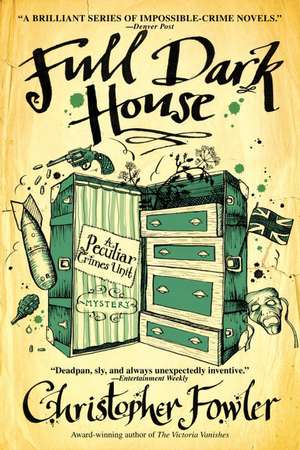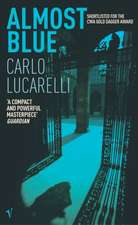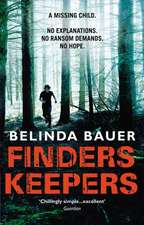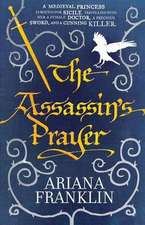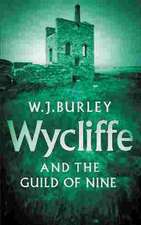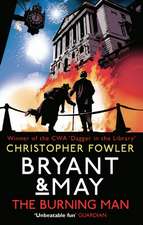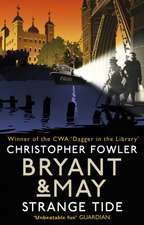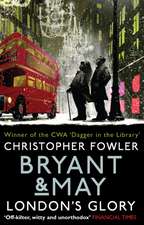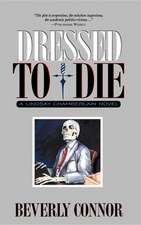Full Dark House: Peculiar Crimes Unit Mysteries (Bantam Paperback)
Autor Christopher Fowleren Limba Engleză Paperback – 31 aug 2008 – vârsta de la 14 până la 18 ani
| Toate formatele și edițiile | Preț | Express |
|---|---|---|
| Paperback (2) | 61.49 lei 26-32 zile | +26.04 lei 10-14 zile |
| Transworld Publishers Ltd – sep 2004 | 61.49 lei 26-32 zile | +26.04 lei 10-14 zile |
| Bantam – 31 aug 2008 | 94.45 lei 3-5 săpt. |
Preț: 94.45 lei
Nou
Puncte Express: 142
Preț estimativ în valută:
18.07€ • 18.92$ • 14.95£
18.07€ • 18.92$ • 14.95£
Carte disponibilă
Livrare economică 15-29 martie
Preluare comenzi: 021 569.72.76
Specificații
ISBN-13: 9780553385533
ISBN-10: 0553385534
Pagini: 356
Dimensiuni: 159 x 209 x 21 mm
Greutate: 0.3 kg
Editura: Bantam
Seria Peculiar Crimes Unit Mysteries (Bantam Paperback)
ISBN-10: 0553385534
Pagini: 356
Dimensiuni: 159 x 209 x 21 mm
Greutate: 0.3 kg
Editura: Bantam
Seria Peculiar Crimes Unit Mysteries (Bantam Paperback)
Recenzii
"An absolutely riveting account of London during the Blitz."—Booklist
"Atmospheric, hugely beguiling and as filled with tricks and sleights of hand as a magician's sleeve...it is English gothic at its eccentric best; a combination of Ealing comedy and grand opera: witty, charismatic, occasionally touching and with a genuine power to thrill." —Joanne Harris, author of Chocolat
"A first class thriller, but don't expect any sleep." —Sunday Telegraph
"The writing is as ever fluid and pacey, the characterization deft and the plot fresh and ingenious." —Independent on Sunday
"The intrigues of the theater murders, which decimate the cast, create considerable drama..... The dynamic between May and Bryant makes for compelling reading"—Publishers Weekly
“How many locked-room puzzles can the duo unlock before their Peculiar Crimes Unit is disbanded? Many more, one hopes.” —Kirkus Reviews
“A madcap mystery that’s completely crazy and great fun.” —Los Angeles Times
“Chris Fowler is a master of the classical form.” —New Y ork Times Book Review
"Atmospheric, hugely beguiling and as filled with tricks and sleights of hand as a magician's sleeve...it is English gothic at its eccentric best; a combination of Ealing comedy and grand opera: witty, charismatic, occasionally touching and with a genuine power to thrill." —Joanne Harris, author of Chocolat
"A first class thriller, but don't expect any sleep." —Sunday Telegraph
"The writing is as ever fluid and pacey, the characterization deft and the plot fresh and ingenious." —Independent on Sunday
"The intrigues of the theater murders, which decimate the cast, create considerable drama..... The dynamic between May and Bryant makes for compelling reading"—Publishers Weekly
“How many locked-room puzzles can the duo unlock before their Peculiar Crimes Unit is disbanded? Many more, one hopes.” —Kirkus Reviews
“A madcap mystery that’s completely crazy and great fun.” —Los Angeles Times
“Chris Fowler is a master of the classical form.” —New Y ork Times Book Review
Notă biografică
Chrisopher Fowler is the acclaimed author of fifteen previous novels, including the award-winning Full Dark House, and four other Peculiar Crimes Unit mysteries, White Corridor, The Water Room, Seventy-Seven Clocks, and Ten Second Staircase. He lives in London.
From the Hardcover edition.
From the Hardcover edition.
Extras
Chapter One
Out With A Bang
It really was a hell of a blast.
The explosion occurred at daybreak on the second Tuesday morning of September, its shock waves rippling through the beer-stained streets of Mornington Crescent. It detonated car alarms, hurled house bricks across the street, blew a chimney stack forty feet into the sky, ruptured the eardrums of several tramps, denuded over two dozen pigeons, catapulted a surprised ginger tom through the window of a kebab shop and fired several roofing tiles into the forehead of the Pope, who was featured on a poster for condoms opposite the tube station.
As the dissonance pulsed the atmosphere it fractured the city’s fragile caul of civilization, recalling another time of London bombs. Then, as now, dust and debris had speckled down through the clear cool air between the buildings, whitening the roads and drifting in the morning sunlight like dandelion seeds. For a split second, the past and the present melted together.
It was a miracle that no one was seriously injured.
Or so it seemed at first.
When Detective Sergeant Janice Longbright received the phone call, her first thought was that she had overslept and missed the start of her shift. Then she remembered that she had just celebrated her retirement from the police force. Years of being woken at odd hours had taught her to focus her attention within three rings of the bedside telephone. Rubbing dreams from her head, she glanced at the clock and listened to the urgent voice in her ear. She rose from the side of her future husband, made her way quietly (as quietly as she could; she was heavy-footed and far from graceful) through the flat, dressed and drove to the offices above Mornington Crescent tube station.
Or rather, she drove to what was left of them, because the North London Peculiar Crimes Unit had, to all intents and purposes, been obliterated. The narrow maze of rooms that had existed in the old Edwardian house above the station was gone, and in its place wavered fragments of burning lath-and-plaster alcoves. The station below was untouched, but nothing remained of the department that had been Longbright’s working home.
She made her way between the fire engines, stepping across spit-sprays from snaked hosepipes, and tried to discern the extent of the damage. It was one of those closed-in mornings that would barely bother to grow light. Grey cloud fitted as tightly over the surrounding terraces as a saucepan lid, and the rain that dampened the churning smoke obscured her view. The steel-reinforced door at the entrance to the unit had been blown out. Firemen were picking their way back down the smouldering stairs as she approached. She recognized several of the officers who were taping off the pavement and road beyond, but there was no sign of the unit’s most familiar faces.
An ominous coolness crept into the pit of her stomach as she watched the yellow-jacketed salvage team clearing a path through the debris. She dug into the pocket of her overcoat, withdrew her mobile and speed-dialled the first of the two numbers that headed her list. Eight rings, twelve rings, no answer.
Arthur Bryant had no voicemail system at home. Longbright had ceased encouraging him to record messages after his ‘static surge’ experiments had magnetized the staff of a British Telecom call centre in Rugby. She tried the second number. After six rings, John May’s voice told her to leave a message. She was about to reply when she heard him behind her.
‘Janice, you’re here.’ May’s black coat emphasized his wide shoulders and made him appear younger than his age (he was somewhere in his eighties—no one was quite sure where). His white hair was hidden under a grey woollen hat. Streaks of charcoal smeared his face and hands, as though he was preparing to commit an act of guerrilla warfare.
‘John, I was just calling you.’ Longbright was relieved to see someone she recognized. ‘What on earth happened?’
The elderly detective looked shaken but uninjured, a thankfully late arrival at the blast scene. ‘I have absolutely no idea. The City of London Anti-terrorist Unit has already discounted political groups. There were no call signs of any sort.’ He looked back at the ruined building. ‘I left the office at about ten last night. Arthur wanted to stay on. Arthur . . .’ May widened his eyes at the blasted building as if seeing it for the first time. ‘He always says he doesn’t need to sleep.’
‘You mean he’s inside?’ asked Longbright.
‘I’m afraid so.’
‘Are you sure he was still there when you left?’
‘No question about it. I rang him when I got home. He told me he was going to work right through the night. Said he wasn’t tired and wanted to clear the backlog. You know how he is after a big case, he opens a bottle of Courvoisier and keeps going until dawn. His way of celebrating. Mad at his age. There was something in his voice . . .’
‘What do you mean?’
May shook his head. ‘I don’t know. As though he wanted to talk to me but changed his mind, that weird hesitation thing he does on the phone. Some officers in an ARV from the Holmes Road division saw him standing at the window at around four thirty. They made fun of him, just as they always do. He opened the window and told them to bugger off, threw a paperweight at them. I should have stayed with him.’
‘Then we would have lost both of you,’ said Longbright. She looked up at the splintered plaster and collapsed brickwork. ‘I mean, he can’t still be alive.’
‘I wouldn’t hold out too much hope.’
A tall young man in a yellow nylon jacket came over. Liberty DuCaine was third-generation Caribbean, currently attached to the unit in a forensic team with two young Indian women, the brightest students from their year. Liberty hated his name, but his brother Fraternity, who was also in the force, hated his more. Longbright raised her hand.
‘Hey, Liberty. Do they have any idea why—’
‘An incendiary device of some kind, compact but very powerful. You can see from here how clean the blast pattern is. Very neat. It destroyed the offices but hasn’t even singed the roof of the station.’ The boy’s impatience to explain his ideas resulted in a staccato manner of speech that May had trouble keeping up with. ‘There are some journalists sniffing around, but they won’t get anything. You OK?’
‘Arthur couldn’t have got out in time.’
‘I know that. They’ll find him, but we’re waiting for a JCB to start moving some of the rafters. They haven’t picked up anything on the sound detectors and I don’t think they will, ’cos the place came down like a pack of cards. There’s not a lot holding these old houses in one piece, see.’ Liberty looked away, embarrassed to be causing further discomfort.
Longbright started walking towards the site, but May gently held her back. ‘Let me take you home, Janice,’ he offered.
She shrugged aside the proffered hand. ‘I’m all right, I just didn’t think it would end like this. It is the end, isn’t it?’ Longbright was already sure of the answer. Arthur Bryant and John May were men fashioned by routines and habits. They had closed a case and stayed on to analyse the results, catching up, enjoying each other’s company. It was what they always did, their way of starting afresh. Everyone knew that. John had left the building first, abandoning his insomniac partner.
‘Who’s conducting the search? They’ll have to verify—’
‘The fire department’s first priority is to make sure it’s safe,’ said Liberty. ‘Of course they’ll report their findings as quickly as possible. Anything I hear, you’ll know. John’s right, you should go home, there’s nothing you can do.’
May stared up at the building, suddenly unsure of himself.
Longbright watched the column of rusty smoke rising fast in the still grey air. She felt disconnected from the events surround- ing her. It was the termination of a special partnership; their names had been inextricably linked, Bryant, May, Longbright. Now she had left and Bryant was gone, leaving May alone. She had spent so much time in their company that the detectives were more familiar than her closest relatives, like friendly monochrome faces in old films. They had been, and would always be, her family.
Longbright realized she was crying even before she registered the shout, as though time had folded back on itself. A fireman was calling from the blackened apex of the building. She couldn’t hear what he was saying, would not allow herself to hear it. As she ran towards the ruins with the fire officers at her heels, the familiar codes started passing through the rescue group.
A single body, an elderly white male, had been located in the wreckage. For Arthur Bryant and John May, an unorthodox alliance had come to a violent end. They were her colleagues, her mentors, her closest friends. She would not allow herself to believe that Bryant was dead.
An immolation had joined the end to the beginning, past and present blown together. John May had always sensed that routine demise would not be enough for his partner. They had just closed a sad, cruel case, their last together. There were no more outstanding enemies. Bryant had finally started thinking about retirement as the unit headed for a period of radical change, sanctioned by new Home Office policies. He and May had been discussing them only the Friday before, during their customary evening walk to the river. May thought back to their conversation, trying to recall whether they had spoken of anything unusual. They had strolled to Waterloo Bridge at sunset, arguing, joking, at ease in each other’s company.
John and Arthur, inseparable, locked together by proximity to death, improbable friends for life.
From the Hardcover edition.
Out With A Bang
It really was a hell of a blast.
The explosion occurred at daybreak on the second Tuesday morning of September, its shock waves rippling through the beer-stained streets of Mornington Crescent. It detonated car alarms, hurled house bricks across the street, blew a chimney stack forty feet into the sky, ruptured the eardrums of several tramps, denuded over two dozen pigeons, catapulted a surprised ginger tom through the window of a kebab shop and fired several roofing tiles into the forehead of the Pope, who was featured on a poster for condoms opposite the tube station.
As the dissonance pulsed the atmosphere it fractured the city’s fragile caul of civilization, recalling another time of London bombs. Then, as now, dust and debris had speckled down through the clear cool air between the buildings, whitening the roads and drifting in the morning sunlight like dandelion seeds. For a split second, the past and the present melted together.
It was a miracle that no one was seriously injured.
Or so it seemed at first.
When Detective Sergeant Janice Longbright received the phone call, her first thought was that she had overslept and missed the start of her shift. Then she remembered that she had just celebrated her retirement from the police force. Years of being woken at odd hours had taught her to focus her attention within three rings of the bedside telephone. Rubbing dreams from her head, she glanced at the clock and listened to the urgent voice in her ear. She rose from the side of her future husband, made her way quietly (as quietly as she could; she was heavy-footed and far from graceful) through the flat, dressed and drove to the offices above Mornington Crescent tube station.
Or rather, she drove to what was left of them, because the North London Peculiar Crimes Unit had, to all intents and purposes, been obliterated. The narrow maze of rooms that had existed in the old Edwardian house above the station was gone, and in its place wavered fragments of burning lath-and-plaster alcoves. The station below was untouched, but nothing remained of the department that had been Longbright’s working home.
She made her way between the fire engines, stepping across spit-sprays from snaked hosepipes, and tried to discern the extent of the damage. It was one of those closed-in mornings that would barely bother to grow light. Grey cloud fitted as tightly over the surrounding terraces as a saucepan lid, and the rain that dampened the churning smoke obscured her view. The steel-reinforced door at the entrance to the unit had been blown out. Firemen were picking their way back down the smouldering stairs as she approached. She recognized several of the officers who were taping off the pavement and road beyond, but there was no sign of the unit’s most familiar faces.
An ominous coolness crept into the pit of her stomach as she watched the yellow-jacketed salvage team clearing a path through the debris. She dug into the pocket of her overcoat, withdrew her mobile and speed-dialled the first of the two numbers that headed her list. Eight rings, twelve rings, no answer.
Arthur Bryant had no voicemail system at home. Longbright had ceased encouraging him to record messages after his ‘static surge’ experiments had magnetized the staff of a British Telecom call centre in Rugby. She tried the second number. After six rings, John May’s voice told her to leave a message. She was about to reply when she heard him behind her.
‘Janice, you’re here.’ May’s black coat emphasized his wide shoulders and made him appear younger than his age (he was somewhere in his eighties—no one was quite sure where). His white hair was hidden under a grey woollen hat. Streaks of charcoal smeared his face and hands, as though he was preparing to commit an act of guerrilla warfare.
‘John, I was just calling you.’ Longbright was relieved to see someone she recognized. ‘What on earth happened?’
The elderly detective looked shaken but uninjured, a thankfully late arrival at the blast scene. ‘I have absolutely no idea. The City of London Anti-terrorist Unit has already discounted political groups. There were no call signs of any sort.’ He looked back at the ruined building. ‘I left the office at about ten last night. Arthur wanted to stay on. Arthur . . .’ May widened his eyes at the blasted building as if seeing it for the first time. ‘He always says he doesn’t need to sleep.’
‘You mean he’s inside?’ asked Longbright.
‘I’m afraid so.’
‘Are you sure he was still there when you left?’
‘No question about it. I rang him when I got home. He told me he was going to work right through the night. Said he wasn’t tired and wanted to clear the backlog. You know how he is after a big case, he opens a bottle of Courvoisier and keeps going until dawn. His way of celebrating. Mad at his age. There was something in his voice . . .’
‘What do you mean?’
May shook his head. ‘I don’t know. As though he wanted to talk to me but changed his mind, that weird hesitation thing he does on the phone. Some officers in an ARV from the Holmes Road division saw him standing at the window at around four thirty. They made fun of him, just as they always do. He opened the window and told them to bugger off, threw a paperweight at them. I should have stayed with him.’
‘Then we would have lost both of you,’ said Longbright. She looked up at the splintered plaster and collapsed brickwork. ‘I mean, he can’t still be alive.’
‘I wouldn’t hold out too much hope.’
A tall young man in a yellow nylon jacket came over. Liberty DuCaine was third-generation Caribbean, currently attached to the unit in a forensic team with two young Indian women, the brightest students from their year. Liberty hated his name, but his brother Fraternity, who was also in the force, hated his more. Longbright raised her hand.
‘Hey, Liberty. Do they have any idea why—’
‘An incendiary device of some kind, compact but very powerful. You can see from here how clean the blast pattern is. Very neat. It destroyed the offices but hasn’t even singed the roof of the station.’ The boy’s impatience to explain his ideas resulted in a staccato manner of speech that May had trouble keeping up with. ‘There are some journalists sniffing around, but they won’t get anything. You OK?’
‘Arthur couldn’t have got out in time.’
‘I know that. They’ll find him, but we’re waiting for a JCB to start moving some of the rafters. They haven’t picked up anything on the sound detectors and I don’t think they will, ’cos the place came down like a pack of cards. There’s not a lot holding these old houses in one piece, see.’ Liberty looked away, embarrassed to be causing further discomfort.
Longbright started walking towards the site, but May gently held her back. ‘Let me take you home, Janice,’ he offered.
She shrugged aside the proffered hand. ‘I’m all right, I just didn’t think it would end like this. It is the end, isn’t it?’ Longbright was already sure of the answer. Arthur Bryant and John May were men fashioned by routines and habits. They had closed a case and stayed on to analyse the results, catching up, enjoying each other’s company. It was what they always did, their way of starting afresh. Everyone knew that. John had left the building first, abandoning his insomniac partner.
‘Who’s conducting the search? They’ll have to verify—’
‘The fire department’s first priority is to make sure it’s safe,’ said Liberty. ‘Of course they’ll report their findings as quickly as possible. Anything I hear, you’ll know. John’s right, you should go home, there’s nothing you can do.’
May stared up at the building, suddenly unsure of himself.
Longbright watched the column of rusty smoke rising fast in the still grey air. She felt disconnected from the events surround- ing her. It was the termination of a special partnership; their names had been inextricably linked, Bryant, May, Longbright. Now she had left and Bryant was gone, leaving May alone. She had spent so much time in their company that the detectives were more familiar than her closest relatives, like friendly monochrome faces in old films. They had been, and would always be, her family.
Longbright realized she was crying even before she registered the shout, as though time had folded back on itself. A fireman was calling from the blackened apex of the building. She couldn’t hear what he was saying, would not allow herself to hear it. As she ran towards the ruins with the fire officers at her heels, the familiar codes started passing through the rescue group.
A single body, an elderly white male, had been located in the wreckage. For Arthur Bryant and John May, an unorthodox alliance had come to a violent end. They were her colleagues, her mentors, her closest friends. She would not allow herself to believe that Bryant was dead.
An immolation had joined the end to the beginning, past and present blown together. John May had always sensed that routine demise would not be enough for his partner. They had just closed a sad, cruel case, their last together. There were no more outstanding enemies. Bryant had finally started thinking about retirement as the unit headed for a period of radical change, sanctioned by new Home Office policies. He and May had been discussing them only the Friday before, during their customary evening walk to the river. May thought back to their conversation, trying to recall whether they had spoken of anything unusual. They had strolled to Waterloo Bridge at sunset, arguing, joking, at ease in each other’s company.
John and Arthur, inseparable, locked together by proximity to death, improbable friends for life.
From the Hardcover edition.
Descriere
Descriere de la o altă ediție sau format:
When a bomb devastates the office of London's most unusual police unit and claims the life of its oldest detective, Arthur Bryant, his surviving partner John May searches for clues to the bomber's identity.
When a bomb devastates the office of London's most unusual police unit and claims the life of its oldest detective, Arthur Bryant, his surviving partner John May searches for clues to the bomber's identity.
